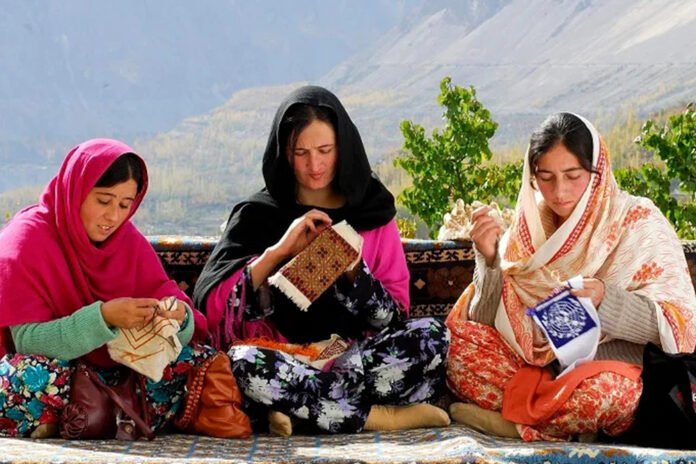Hunza women after tending to the livestock and finishing other domestic chores, head out to a community center in their area, where with other proficient female artisans, they craft tangible stories.
Cross stitch or ‘Iraghi chuk’ in their local language Burushaski, is their forte like many other Hunza. It is also known as ‘Palm Kok’ in upper Hunza. Most of these women are college graduates.
There is no concept of a pitiable, weak woman in Hunza where women are economically empowered and there is hardly any household in Hunza that is not educated. Most importantly, all women are skilled in handicraft — be it embroidery or cross stitch — a skill that is being passed through generations.
Some work for NGOs that collect cross-stitch handicrafts from local artisans and sell those ahead, thus helping Hunza women showcase their art. “However, after a span of three years, the grant period was exhausted, and eventually the NGO was closed down. Being educated some women organized to establish their own business Karakoram Handicrafts, which works on the same idea and has emerged as a testament to our art. A decade on, the business has been able to develop its market and penetrate several parts of the country through social media.
Through a seller, they were able to develop a market in Islamabad, Lahore, and Karachi. But being able to maintain her existing customer base and acquiring repeat customers, while enjoying a nationwide presence, was only possible through e-commerce.
They then decided to enter the world of digital marketing and explore the concept of the “zero moment of truth” introduced by Google, which empowers customers to research products before making a purchase. They also enrolled in a digital marketing course being offered by Daraz in collaboration with Aga Khan Rural Support Programme which enabled her to open her shop on the platform.
Presently, Karakoram Handicrafts caters to a growing demand for hand-crafted fashion, household, and lifestyle products such as bedsheets, cushions, purses, caps, dresses and clutches, etc, through convenience and premium pricing. Initially, the product line was limited to hats and coats, but the business has come a long way with innovative ideas.
The unified artisan women force of Gilgit-Baltistan collectively contribute to manufacturing these products. While these busy bees are creating their pieces of art throughout the year, their selling window which was previously limited to the warm seasons of spring and summer has now been expanded through e-commerce.
The artisans of Gilgit-Baltistan envision streamlined supply chains and even backward integration to manage their variable costs. Due to the limitation of electricity, a cross-stitch weaving cottage industry closed down and these women now cater to orders from Lahore but it adds to their transport cost. Despite all odds, they are determined and content to excel and continue with their routine with a smile.
A young artist from Skardu, decided to create a traditional handmade cap for her daughter since she couldn’t find one in the local market. Her motherly love enabled the creation of something that turned out to be a stepping stone for her business. Well aware of the challenges that traditional crafts production faces in terms of staying viable and accessible, especially for locals, not to mention the tourists who seek them out, she figured out the convenience being offered on the net both to the seller and the buyer. She identified a market gap and discovered an opportunity to promote their local crafts and grow a customer base extending beyond Gilgit-Baltistan.
She says her business supplies goods for fashion enthusiasts. The work involves manual labor, and the basic skills learned from ancestors help tremendously when it comes to traditional art and culture.
Technology has not just helped huge metropolises such as Karachi or Islamabad but also home-based sellers like her who belong to a small city in the middle of nowhere, where internet and electricity are luxurious commodities and people have not yet become highly dependent on automation.
Pakistan’s e-commerce market is growing rapidly with an annual growth rate of 6.23 percent, thanks to the pandemic for the initial push. Some 8.4 percent of internet users make weekly online purchases with the rate of adoption rising rapidly.
Considering the popularity of social media, businesses such as these have leveraged various platforms to penetrate the market and grow their customer base while previously ease of access was a challenge for the end consumer. This is where e-commerce turned out to be a boon that helped develop a market for the women of Hunza so that their handicrafts are accessible in every nook and corner of Pakistan where elegant Hunza products were unheard of previously and acquiring these treasures meant traveling all the way to Hunza.



